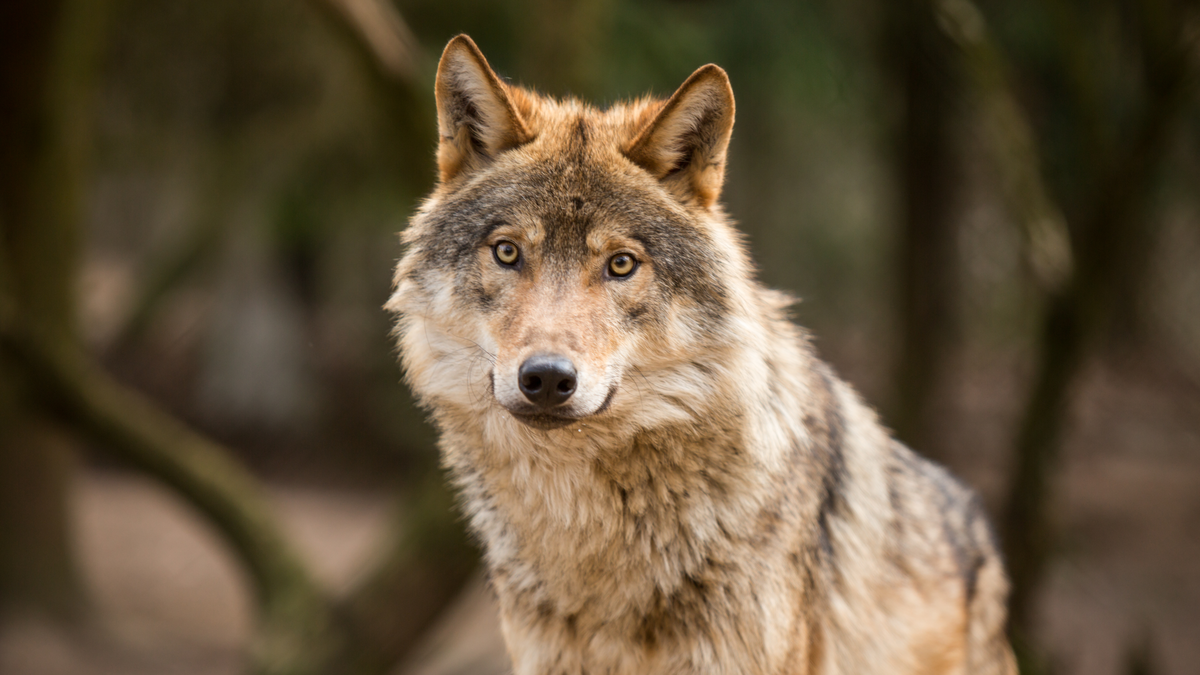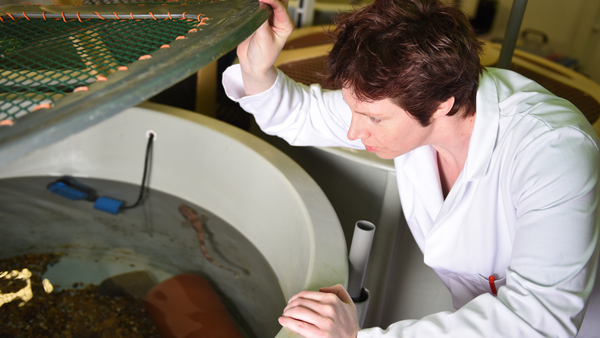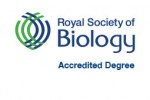Introduction
Combine Biology and Psychology to measure and understand the behaviour of wild animals, the behaviour and welfare of companion, domestic, and captive exotic animals, and explore links between behaviour and applications such as conservation.
Study Information
At a Glance
- Learning Mode
- On Campus Learning
- Degree Qualification
- BSc
- Duration
- 48 months
- Study Mode
- Full Time
- Start Month
- September
- Location of Study
- Aberdeen
- UCAS Code
- C349
- Pathway Programme Available
- Undergraduate Foundation Programme

Animal Behaviour is an interdisciplinary degree and field of science that examines why animals do the things they do, and what consequences their actions have for their survival and impacts on the wider ecosystem. Behaviour is especially fascinating as it is highly flexible, it gives us some of the most mesmerising phenomena in the natural world, and feedback from behavioural decisions in turn drives evolutionary processes. Our Animal Behaviour degree differs from our Zoology degree in that it includes courses from Psychology in the first two years.
What You'll Study
Each year you take a selection of compulsory courses and optional courses that can be chosen from those on offer across the institution. The first two years lay a foundation for the more specialised third and fourth years.
- Year 1
-
All students take eight courses in the first year. On this degree you take seven compulsory courses and one elective, which can be selected from any discipline in the university.
Compulsory Courses
- Getting Started at the University of Aberdeen (PD1002)
-
This course, which is prescribed for level 1 undergraduate students (and articulating students who are in their first year at the University), is studied entirely online, takes approximately 5-6 hours to complete and can be taken in one sitting, or spread across a number of weeks.
Topics include orientation overview, equality and diversity, health, safety and cyber security and how to make the most of your time at university in relation to careers and employability.
Successful completion of this course will be recorded on your Enhanced Transcript as ‘Achieved’.
- Frontiers in Biological Sciences (BI1009)
-
15 Credit Points
Five themes, critical to understanding biology and life, will be explored – Developmental Biology, Microbiology and Disease, Evolution and Behaviour, Immune Systems and Environmental Physiology. Each theme is structured to provide you with core knowledge, insight into how science is practiced, an introduction to current research topics and skills that are useful for investigating, recording and analysing information. The course will be delivered using a blended learning approach and can be taken by students who will be on campus in first semester, or those who may choose to stay at home
- Diversity of Life 1 (BI1012)
-
15 Credit Points
A walk through the evolutionary tree of life, examining the amazing diversity of major groups of organisms from plants through fungi to early invertebrates. Learn about how each group of organisms arose, their characteristics, and how they achieved success. Practical activities provide hands on experience of materials demonstrating the diversity of plants and invertebrates.
- Introductory Psychology I: Concepts and Theory (PS1009)
-
15 Credit Points
PS1009 introduces you to major concepts and theories in psychology to provide you with a strong understanding of the human mind and behaviour. You will attend lectures on biological, social and cognitive psychology and participate in tutorials where you will work with peers to discuss topics related to the lecture materials. Studying psychology is beneficial to a wide range of careers including management, education, and counselling, to name a few.
- Ecology and Environmental Science (BI1511)
-
15 Credit Points
This course begins with study of the physical workings of the Earth and the interactions between living organisms and their environments. We then look at the effects humans are having on the planet, potential solutions to global problems and thoughts on the future.
Teaching is by staff with different subject specialisms who give both variety and immediacy to course material.
Exposure to the problems we are facing both now and in the future will help you make informed choices in your everyday life.
A range of ‘wet’ and computer-based practicals enhance the classroom teaching and develop generic scientific skills.
- Diversity of Life 2 (BI1512)
-
15 Credit Points
- A walk through the evolutionary tree of life, examining the amazing diversity of advanced invertebrates and vertebrates.
- Learn about how each group of organisms arose, their characteristics, and how they achieved success. For example what are the key evolutionary steps enabling life away from the water? How do birds fly?
- Practical activities provide hands on experience of materials demonstrating the features of invertebrates, amphibians, fish, birds and mammals.
- Introductory Psychology II: Concepts and Theory (PS1509)
-
15 Credit Points
PS1509 introduces you to major concepts and theories in psychology to provide you with a strong understanding of human mind and behaviour. You will attend lectures on evolution & emotion, lifespan development, and sensation & perception and participate in tutorials where you will work with peers to discuss topics related to the lecture materials. Studying psychology is beneficial to a wide range of careers including management, education, and counselling, to name a few.
- The Cell (SM1501)
-
15 Credit Points
• Cells are the fundamental unit of life – without them life could not exist, and as such understanding how they function is crucial to our understanding of biology and medical science.• This course provides theoretical knowledge in a diverse range of topics covering the fascinating world of cells, from molecules like DNA, to how different cell types function within our bodies.• All practical classes are research based and will provide theoretical knowledge and skills training in many areas of molecular and cell biology.• Employability skills will also be explored through a highly interactive enterprise session and our online mini course.
Optional Courses
Plus select 15 credit points from Term1 courses of choice
- Year 2
-
In year two you will take six compulsory courses and two electives. Both electives can be selected from any discipline in the university.
Compulsory Courses
- Biological Enhanced Skills Training (BEST) (BI2018)
-
15 Credit Points
The course will help you develop or consolidate skills in experimental design, sampling, analysis, presentation, and interpretation of data.
Each week, there are one 1-2 recorded introductory lectures to help you prepare for the computer practicals. In two 2-hour sessions per week you will work through a series of computer-based data tasks, using relevant and realistic biological and environmental themes. The course will introduce you to different types of software which can be used to analyse data, including Excel, Minitab, and R studio.Teaching is informal and friendly. During sessions, staff will chat to you about your progress and provide help where necessary.
- Ecology (BI2020)
-
15 Credit Points
This course builds on themes from introductory ecology courses: effects of biodiversity, disturbance in natural communities, nutrient and energy cycles. herbivory, predation, competition, population dynamics, parasitism, mutualisms and foodwebs. You will develop your abilities to interpret data by applying theory discussed in classes to real-life data sets using short problem-solving exercises linked to each topic. Feedback will help you improve writing and interpretation skills. Extended problem-solving exercises will improve your communication skills, scientific writing and introduce you to valuable approaches to summarising complex datasets in Excel. You will also consider issues around experimental design.
- Introduction to Genetics (BI2023)
-
15 Credit Points
Genetics and evolution are inextricably linked and provide the foundation for all other biological concepts. In this course we introduce the subject of genetics from an evolutionary perspective that is informed by genome analysis.A series of lectures and computer workshops will introduce you to the fundamental principles of evolution, genetics and molecular biology. In practical classes you will have opportunity to practise modern molecular techniques.You will also explore ethical dilemmas that arise as a consequence of our potential ability to manipulate genomes.
- Comparative Physiology 1 (BI2524)
-
15 Credit Points
Do you know how your body functions? The body is analogous to a complex machine that depends on appropriate functioning of all of parts. Physiology is the study of how the parts work and interact with other parts to support the normal functioning of the organism.
This course introduces the basics of animal physiology, highlighting similarities and differences in animals across the tree of life.
Lectures provide theoretical understanding of the processes that underpin the functioning of and communication between cells, tissues and organs.
Practicals allow you to apply concepts and develop lab skills.
Through the study of examples from across different phyla, you gain an appreciation of processes fundamental to all animals, and of differences across groups.
The assessments give you the opportunity to consolidate your learning, explore a topic of interest in more depth and develop transferrable skills.
Optional Courses
Plus select 45 credit points from courses of choice.
- Year 3
-
Year three consists of eight courses; six compulsory and two elective.
Compulsory Courses
Year 3 consists of the following courses:
ZO3515 - Animal Evolution and Biodiversity
- Statistical Analysis of Biological Data (BI3010)
-
15 Credit Points
You will utilise a robust approach to statistical analysis, a skill highly valued by employers and researchers.Lectures provide context, background and step-by step guidance on how to conduct and interpret a selection of statistical analyses.Through a series of exercises, you learn to explore data, to specify appropriate linear models for your research question and to interpret their results.Online tests structured around the exercises and lecture content allow you to demonstrate your achievement of course learning outcomes.Working with biological and environmental datasets in a structured and supportive environment, you will gain confidence and proficiency with data analysis.
- Animal Management and Welfare (ZO3309)
-
15 Credit Points
This course considers the evolution, physiology and behaviour of domestic, companion and captive wild animals in relation to their husbandry and care.
You will apply your knowledge of biology and zoology to the improvement of management practices and to the enhancement of animal welfare. Field trips to local farms and a wildlife park will allow you to observe industry standards for captive animal welfare.
By researching and presenting a seminar on ethical issues related to animals in captivity, you will develop critical thinking skills and build experience in constructing and evidencing an argument, and also gain skills in group working and oral communication.
- Behavioural Biology (BI3505)
-
15 Credit Points
Fundamental concepts of animal behaviour are introduced through a series of lectures and practicals, essential knowledge for those interested in better understanding animal behaviour as well as potentially undertaking an animal behaviour Honours project.
During the practicals students are encouraged to reflect on the theoretical knowledge learned during the lectures and apply that in explaining the observed behaviour of animals.
Students will have the opportunity to demonstrate their understanding of animal behaviour by producing an innovative multimedia presentation on the observed behaviour of a species of their choice.
- Gateway to Honours Project (BI3511)
-
This non-credit bearing course will facilitate your preparation for your Honours project.
Lectures and workshops will clarify expectations for project work and provide training in risk assessment, consideration of ethical issues, environmental impacts and project planning.
Resources to help you define and plan your project will be made available through MyAberdeen, helping you to be confident that your project planning is sufficiently advanced by the end of your Programme Year 3.
Submission of an agreed (with your supervisor) project outline, completed checklists and preliminary risk assessment will allow you to demonstrate engagement with your project.
- Practical Skills in Animal Behaviour (ZO3813)
-
15 Credit Points
Weekly practical activities will provide opportunities to observe animals, develop an understanding of the adaptive value of animal behaviour, and the practical methods we use to study it. Each will be preceded by a lecture covering the subject area and the expectations for the practical that week.
Tasks involving the design of simple experiments to address cause and function of animal behaviour will develop skills in experimental design and hypothesis testing.
Training in the use of a lab/field notebook allows students to demonstrate competence in record keeping. Written reports on a practical experiment supports the develop of communication skills.
Students will apply their knowledge by conducting their own research project, setting their question and choosing a study system, collecting, visualising, and analysing data, and writing up the report
Optional Courses
Plus select 45 credit points from courses of choice.
- Year 4
-
In year 4, the honours year, you will carry out a research project as well as writing an extended essay and completing advanced courses of your choosing.
Compulsory Courses
- SBS Honours Project (BI4016)
-
45 Credit Points
This independent research project develops your skills in scientific inquiry and critical analysis, as well as important generic skills, including presentation and time management.
Projects are field-, lab- and/or desk-based, developed on a topic of your interest under the direction of a supervisor.
Training in skills needed to perform your project is provided by world-leading researchers and their teams.
Workshops and drop-in sessions provide training in data analysis and thesis production.
This skill set will be appropriate for advanced study in the field of biological science or other careers where the generic skills that you will develop are highly valued.
- Behavioural Ecology and Conservation (ZO4543)
-
15 Credit Points
This course will give you the opportunity to learn about contemporary topics in fundamental behavioural ecology and how this knowledge can be applied to improve the conservation and management of animals.
Academics working at the cutting edge of behavioural research will report on the state-of-art in their field., while you will gain direct experience of in silico approaches regularly used by researchers. Directed learning activities will encourage further exploration of the latest advances in the field through recorded lectures and conference presentations and the critical examination of journal articles and pre-prints.
You will develop your understanding of the state of the art in the field and be introduced to the process of research planning by reviewing grant proposals.
Optional Courses
Plus 60 credits from courses of choice, at least 30 of which must be from courses delivered by the School of Biological Sciences (i.e. BI, EK, EV, FY, PL, or ZO courses) at level 4.
A graduating curriculum for the Honours programme must include at least 90 credit points from Level 4 courses.
We will endeavour to make all course options available. However, these may be subject to change - see our Student Terms and Conditions page.
How You'll Study
Combine practice and theory
Typically, one third of your class time is practical and many courses include full-day practical classes and field visits. Most students take at least one residential field trip during their degree; these trips bring the subjects to life and provide the opportunity to make great friendships and get to know staff members.
Research experience
You are actively involved in scientific research throughout your degree. In Year 4, you conduct independent research which can be pivotal to your career choice whether it be in dolphins, water voles, rare plants, tropical forest ecology, climate change in the Arctic, or any one of a diverse range of other exciting topics!
Engaging and inspiring teaching
Our teaching methods are diverse, innovative and based on research on how students learn. For example, we use problem-based learning approaches, creative presentations, peer and self-assessment, presenting posters in public meetings, writing and editing wikis, writing grant proposals, science writing for publication, and the creation of portfolios using multi-media.
Opportunities for Study Abroad and work-related learning
You can take advantage of an optional year-out on a work placement and study abroad is encouraged for students in their 2nd year. We invite employers and volunteering organisations to come and meet our students at our career evenings and there are opportunities for students to work with our partner institutions within and outside of Aberdeen.
Learning Methods
- Field Trips
- Group Projects
- Lab Work
- Lectures
- Research
- Tutorials
Assessment Methods
Students are assessed by any combination of three assessment methods:
- coursework such as essays and reports completed throughout the course;
- practical assessments of the skills and competencies learnt on the course; and
- written examinations at the end of each course.
The exact mix of these methods differs between subject areas, year of study and individual courses.
Honours projects are typically assessed on the basis of a written dissertation.
Why Study Animal Behaviour?
- Unique programme combining the fields of biology and psychology – understand behaviour from all angles: evolution, development, mechanisms, and adaptive significance.
- Teaching from researchers in biology and psychology gives access to the cutting edge of both subject areas.
- Get to grips with methods for observing and measuring behaviour in our state-of-the-art Science Teaching Hub and through field trips to nature reserves to observe the behaviour of wild animals such as seals in their natural habitat.
- Academic and transferrable skills such as data science are built into the learning experience to maximise employability.
- You will have the opportunity to get involved in our research through summer research assistantships, project work and the final year research project.
- Programme Coordinator Dr David Fisher received the Association for the Study of Animal Behaviour’s Barnard Award in 2023.
Entry Requirements
Qualifications
The information below is provided as a guide only and does not guarantee entry to the University of Aberdeen.
General Entry Requirements
- 2024 Entry
-
SQA Highers
Standard: AABB*
Applicants who have achieved AABB (or better), are encouraged to apply and will be considered. Good performance in additional Highers/ Advanced Highers may be required.
Minimum: BBB*
Applicants who have achieved BBB (or are on course to achieve this by the end of S5) are encouraged to apply and will be considered. Good performance in additional Highers/Advanced Highers will normally be required.
Adjusted: BB*
Applicants who have achieved BB, and who meet one of the widening access criteria are are guaranteed a conditional offer. Good performance in additional Highers/Advanced Highers will be required.
* Including good performance in at least two Mathematics/ Science subjects by the end of your senior phase of education.
More information on our definition of Standard, Minimum and Adjusted entry qualifications.
A LEVELS
Standard: BBB*
Minimum: BBC*
Adjusted: CCC*
* Including good performance in at least two Mathematics/ Science subjects by the end of your senior phase of education.
More information on our definition of Standard, Minimum and Adjusted entry qualifications.
International Baccalaureate
32 points, including 5, 5, 5 at HL, with two Mathematics/ Science subjects at HL.
Irish Leaving Certificate
5H with 3 at H2 AND 2 at H3 including a minimum of H3 from two Science or Mathematics subjects.
Entry from College
Advanced entry to this degree may be possible from some HNC/HND qualifications, please see www.abdn.ac.uk/study/articulation for more details.
- 2025 Entry
-
SQA Highers
Standard: BBBB*
Applicants who have achieved BBBB (or better), are encouraged to apply and will be considered. Good performance in additional Highers/ Advanced Highers may be required.
Minimum: BBB*
Applicants who have achieved BBB (or are on course to achieve this by the end of S5) are encouraged to apply and will be considered. Good performance in additional Highers/Advanced Highers will normally be required.
Adjusted: BB*
Applicants who have achieved BB, and who meet one of the widening access criteria are are guaranteed a conditional offer. Good performance in additional Highers/Advanced Highers will be required.
Foundation Apprenticeship: One FA is equivalent to a Higher at A. It cannot replace any required subjects.
* Including good performance in at least two Mathematics/ Science subjects by the end of your senior phase of education.
More information on our definition of Standard, Minimum and Adjusted entry qualifications.
A LEVELS
Standard: BBC*
Minimum: BCC*
Adjusted: CCC*
* Including good performance in at least two Mathematics/ Science subjects by the end of your senior phase of education.
More information on our definition of Standard, Minimum and Adjusted entry qualifications.
International Baccalaureate
32 points, including 5, 5, 5 at HL, with two Mathematics/ Science subjects at HL.
Irish Leaving Certificate
5H with 3 at H2 AND 2 at H3 including a minimum of H3 from two Science or Mathematics subjects.
Entry from College
Advanced entry to this degree may be possible from some HNC/HND qualifications, please see www.abdn.ac.uk/study/articulation for more details.
The information displayed in this section shows a shortened summary of our entry requirements. For more information, or for full entry requirements for Sciences degrees, see our detailed entry requirements section.
English Language Requirements
To study for an Undergraduate degree at the University of Aberdeen it is essential that you can speak, understand, read, and write English fluently. The minimum requirements for this degree are as follows:
IELTS Academic:
OVERALL - 6.0 with: Listening - 5.5; Reading - 5.5; Speaking - 5.5; Writing - 6.0
TOEFL iBT:
OVERALL - 78 with: Listening - 17; Reading - 18; Speaking - 20; Writing - 21
PTE Academic:
OVERALL - 59 with: Listening - 59; Reading - 59; Speaking - 59; Writing - 59
Cambridge English B2 First, C1 Advanced or C2 Proficiency:
OVERALL - 169 with: Listening - 162; Reading - 162; Speaking - 162; Writing - 169
Read more about specific English Language requirements here.
International Applicants who do not meet the Entry Requirements
The University of Aberdeen International Study Centre offers preparation programmes for international students who do not meet the direct entry requirements for undergraduate study. Discover your foundation pathway here.
Fees and Funding
You will be classified as one of the fee categories below.
| Fee category | Cost |
|---|---|
| RUK | £9,250 |
| Tuition Fees for 2024/25 Academic Year | |
| EU / International students | £24,800 |
| Tuition Fees for 2024/25 Academic Year | |
| Home Students | £1,820 |
| Tuition Fees for 2024/25 Academic Year |
Scholarships and Funding
Students from England, Wales and Northern Ireland, who pay tuition fees may be eligible for specific scholarships allowing them to receive additional funding. These are designed to provide assistance to help students support themselves during their time at Aberdeen.
Additional Fees
- In exceptional circumstances there may be additional fees associated with specialist courses, for example field trips. Any additional fees for a course can be found in our Catalogue of Courses.
- For more information about tuition fees for this programme, including payment plans and our refund policy, please visit our Tuition Fees page.
Our Funding Database
View all funding options in our Funding Database.
Careers
We are committed to the career progression of our students and we collaborate with the University’s Careers and Employability Service to ensure that you have numerous opportunities to explore career options, develop your employability and connect with employers.
- The expertise and support of a dedicated careers professional who is a specialist in the types of careers and further study undertaken by Biological Science students.
- A mentoring scheme run by the Careers and Employability Service linking current students with professional mentors.
- An annual volunteering fair to connect students with appropriate organisations in conservation and the environment.
- The exploration of possible careers and the development of employability from week 1, via the mandatory “Frontiers of Science” and PD1002 careers course.
- One to one appointments to discuss students’ options, provide practical support around internships, placements and part time work and provide support for effective applications and interviews.
- Regular opportunities through the “speed careering” programme for current students to meet and learn from Biological Sciences graduates.
- Employer input to the design of the curriculum and in talks to students about career opportunities.
- A university-wide co-curriculum programme aimed at developing key employability skills sought by employers.
For more information visit www.abdn.ac.uk/careers or email careers@abdn.ac.uk.
Graduates in Animal Behaviour can expect employment opportunities in animal sciences in zoological, veterinary, and commercial areas; pharmaceuticals and applied medicine; conservation and natural resource management; and education and research. This degree may also be a good choice as a pre-medical degree programme for international students interested in medicine, veterinary science or dentistry.
Industry Links
We have strong local, national and international links to industry, government bodies, charities and other research institutions. You will benefit from these links in several ways:
- Exposure to policy-makers, practitioners, regulatory professionals and experts.
- Our curriculum is informed by an employer advisory board that provides insight into changing requirements of employers.
- You can take advantage of our collaborators' facilities and expertise for your research projects or placement.
Accreditation
Graduates from Accredited programmes will receive one year of free membership of the Royal Society of Biology in their final year of their degree. This will open up networks at a crucial time when applying for jobs. The Royal Society of Biology is the leading professional body for the biological sciences in the United Kingdom. The Society represents over 18,000 biologists from all areas of the life sciences, as well as over 100 organisations which make up the diverse landscape of biology in the UK and overseas. The Royal Society of Biology offers members unique opportunities to engage with the life sciences and share their passion for biology. Whichever area of biology you wish to gain a career in, membership will help you:
- Stay up to date with what is happening across the life sciences
- Gain additional recognition for your skills and experience
- Develop your professional network
- Demonstrate your support for the future of biology
This degree holds accreditation from
Our Experts
- Other Experts
- Mrs Cath Dennis
- Dr Lesley Lancaster
- Programme Coordinator
- Dr David Fisher
Information About Staff Changes
You will be taught by a range of experts including professors, lecturers, teaching fellows and postgraduate tutors. However, these may be subject to change - see our Student Terms and Conditions page.
Facilities
Fantastic facilities support our teaching and research, both on and off campus.

Research facilities
Our research facilities on campus include animal holding facilities, greenhouses, fresh and salt-water aquaria, an insectarium, molecular and analytical laboratories, and a state of the art genomics lab.

Lighthouse Field Station
We have our own research and teaching facility, The Lighthouse Field Station which is situated on the Cromarty Firth. In 2020 the station celebrated 30 years of teaching and research on the ecology of seals, dolphins and seabirds.

Science Teaching Hub
Our state-of-the-art Science Teaching Hub provides students with a digitally focussed environment including advanced analytical tools, research-grade equipment and flexible laboratory spaces.
Find out moreDiscover Uni
Discover Uni draws together comparable information in areas students have identified as important in making decisions about what and where to study. You can compare these and other data for different degree programmes in which you are interested.
Get in Touch
Contact Details
- Address
-
Student Recruitment & Admissions
University of Aberdeen
University Office
Regent Walk
Aberdeen
AB24 3FX

